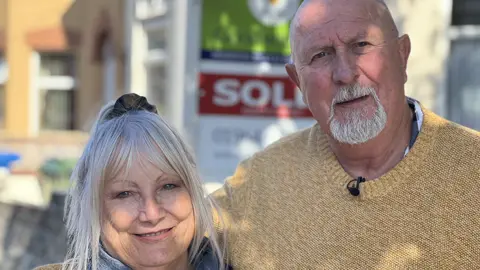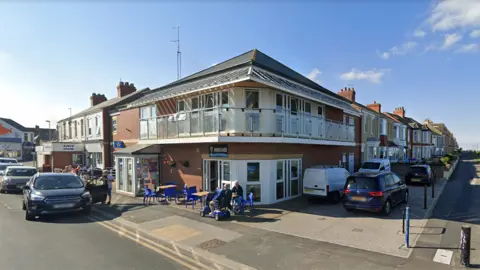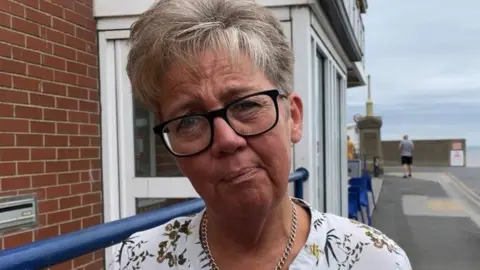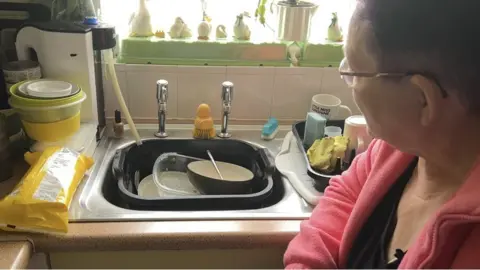Cost of living: The people trying to make ends meet as costs spiral
 BBC
BBCAs people across the UK face a winter in the grasp of a cost of living crisis, the BBC in East Yorkshire has been following members of one coastal community to see the impact of rising prices. BBC News' Caroline Bilton spoke to residents to find out how they are coping.
Jim Blake and Lorraine Clark made the decision to live in Withernsea during a weekend visit to friends almost 20 years ago.
The couple moved up from their home in London 18 years ago after "falling in love" with the place during the brief trip.
"We hadn't been here 24 hours and we'd put an offer in on this house," Mr Blake says.
But with rising energy costs the pair have reluctantly decided to sell their five-bedroom dream home to move to a smaller property on the same street.
Mr Blake 72, said their minds were made up after they realised that as electric and gas costs went up their pensions "had diminished in their output through no fault of our own".
The couple, who don't claim benefits, spend £200 each month on gas and electric on a fixed-rate tariff.
Mr Blake hopes the move will bring lower outgoings, adding: "We might have a little bit more of a retirement and we can do some of the things we were originally going to do."
"I just want to not to have to worry about how much I have to spend," he tells me.
"You still want to know that you can turn that electric light on, you can go out to the shop and think, 'oh I like that, I'll buy that.'
"At one time I could tell you to the penny what I've got in my bank account but now I don't want to."
With the weather beginning to turn colder, the rise in energy bills is on most people's minds, despite the price cap and other support measures announced by the government.
 Google
GoogleOne charity worker in the town said the £400 energy discount and a cap on prices was "not even going to touch the side" for many.
Jayne Nendick, who works at The Shores Centre on the town's seafront, said the building's energy bill had risen from £15,000 to £55,000 per year.
That means the centre, which is host to many community support groups, now itself needs to find additional funding.
On the verge of tears, Ms Nendick says: "As a charity we've always generated our own income and I've been very very proud of that.
"We've done it all ourselves over the last 17 years and I feel very proud of that. We have stood on our own ground. And for the first time in 17 years I'm having to look at it."
"There's going to be more people who need us," she said.
"So, it's got to happen. I will make sure it happens come hell or high water. We will find a way. We will."

With the summer season over there are fewer people on the streets and the promenade, which is dominated by the the remains of its demolished Victorian pier.
In the rows of houses stretching back from the North Sea the many retirees who have made the town their home are finding ways to reduce their fuel bills.
Widower Susie switched off the boiler in March at her small bungalow, which she shares with her two dogs.
The 71-year-old, who lives on her basic state pension of £137.50 per week, says the final straw was when she realised she was paying more in bills than her income.
"It's all very well turning it off in the summer, it's a different matter in the winter.
"And I'll be quite honest - I don't know how far it will go before I finally say I can't cope with this it's too cold I'm turning the boiler on.
"There may be a time when my resolve breaks and that's worrying because, how much is that going to cost me?"

The house-proud former chef has made other economies including only washing dishes every few days and buying a hot water dispenser so she only heats the water she needs.
She has also invested in an electric blanket.
'I'm not taking this lightly. Its either, as the old phrase says, laugh or cry. I'd rather laugh. But actually, this isn't funny this is serious," she says grimly.
"I know a lot of people who are actually worried sick. I spoke to a fellow pensioner and she said she was bloody terrified.
"I'm not prepared to die of hypothermia or end up with pneumonia or in any way compromise my health seriously because of a bill.
"But equally, when they start quoting you that bills are going to double, it's scary.
"I didn't grow up in houses with central heating. I'm living my life out now in a house that might as well not have any, all because of the cost."
A spokesperson for the Department for Business, Energy and Industrial Strategy said: "We know it's difficult for families across the country which is why we have put in place immediate support for the coming winter. Government energy support schemes mean millions of the most vulnerable households will be receiving a total of £1,200 each this year. Meanwhile, the Energy Bill Relief Scheme will protect businesses by cutting the price of energy by more than half the wholesale price."
If you have been affected by issues raised in this story, there is information and support available via the BBC Action Line.

Follow BBC East Yorkshire and Lincolnshire on Facebook, Twitter, and Instagram. Send your story ideas to [email protected].
